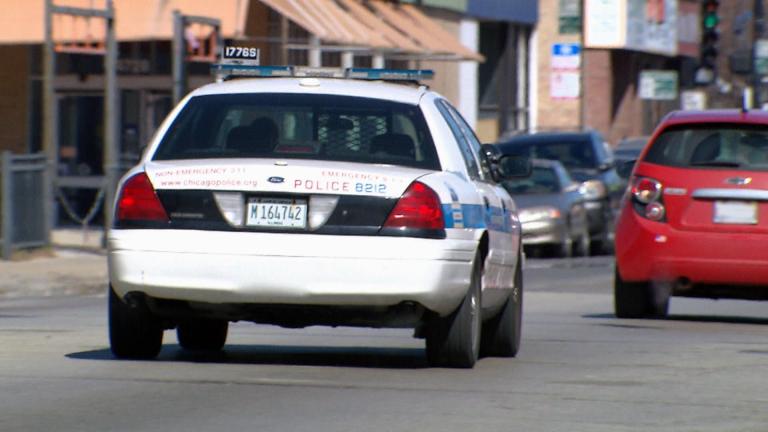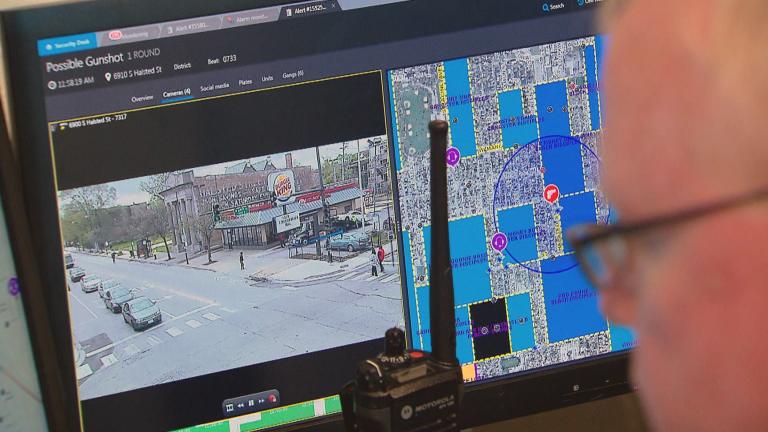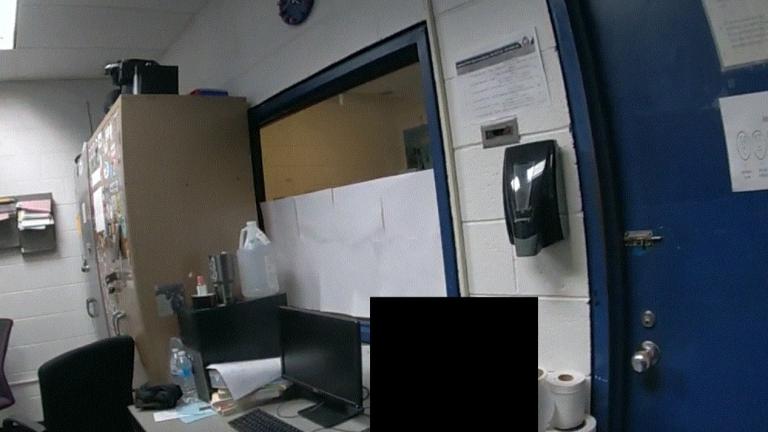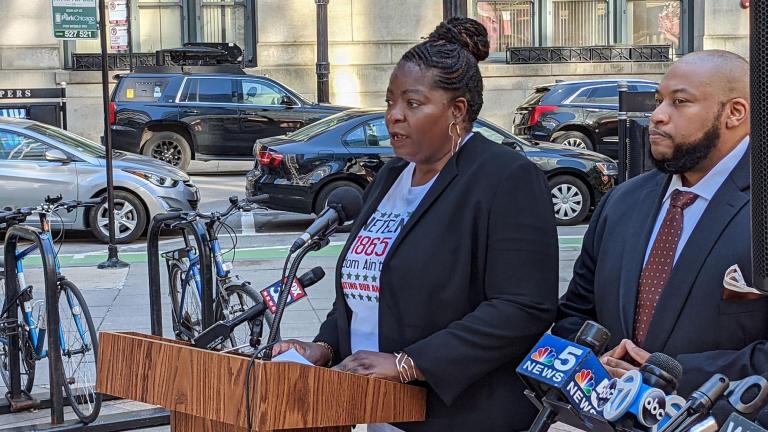 (WTTW News)
(WTTW News)
Chicago taxpayers spent $280 million to resolve lawsuits alleging Chicago police officers committed a wide range of misconduct — including false arrest and excessive force — from spring 2019 to spring 2023, according to an analysis of city data by WTTW News.
Between May 2019, when former Mayor Lori Lightfoot replaced former Mayor Rahm Emanuel, and May 2023, when Mayor Brandon Johnson took office, the city spent an average of $70.2 million annually to resolve more than 500 lawsuits alleging police misconduct, according to WTTW News’ data analysis.
While in office, Lightfoot vowed to get control of the of the toll of misconduct settlements but failed to do so according to the data. Instead, Chicago taxpayers paid an average of 30% more each year to resolve police misconduct lawsuits, as compared with her predecessor, according to the data.
In a statement to WTTW News, a spokesperson for Lightfoot said many of the police misconduct cases resolved during her four-year term began under Emanuel, making an "apples to apples comparsion" impossible. Likewise, many of the cases resolved during Emanuel’s first term originated under former Mayor Richard M. Daley.
“Upon taking office, Mayor Lightfoot directed her legal team to take an aggressive approach to settling police misconduct lawsuits against the city, and especially wrongful conviction cases, quickly and fairly — both to prevent drawn out litigation that would be more costly for taxpayers, and to ensure just agreements with impacted plaintiffs,” according to the statement from Lightfoot's spokesperson.
During Emanuel’s eight years as Chicago mayor, taxpayers spent an average of $53 million annually to resolve police misconduct lawsuits, according to WTTW News’ data analysis.
In all, Chicago taxpayers paid $710 million between May 2011 and May 2023 to resolve more than 2,500 cases during Lightfoot and Emanuel’s time in office.
A spokesperson for the Chicago Department of Law, now led by Corporation Counsel Mary Richardson Lowry, declined to comment on the city’s litigation strategy, but said the office is “committed to working with the Chicago Police Department and the new superintendent, once appointed, to explore effective ways to minimize risk.”
WTTW News’ analysis of 12 years of settlements and verdicts included all cases identified by the Chicago Law Department of Law as caused by some form of police misconduct, including false arrest, excessive force, extended detention, malicious prosecution and illegal search or seizure. It does not include cases involving motor vehicle collisions other than crashes caused by pursuits launched by officers.
The cost of resolving police misconduct lawsuits has become a frequent source of political heartburn for members of the Chicago City Council, who are divided along ideological lines about the cause of the escalating costs. The City Council must ratify all settlements of $100,000 or more.
Conservative alderpeople say the city’s lawyers and their colleagues are too eager to settle cases before trial. According to the alderpeople, that encourages those guilty of criminal wrongdoing to sue the city in the hopes of an easy payday.
However, progressive members of the City Council see the expense as perhaps the most visible cost of the fact that city officials have yet to put an end to the decades of scandals, misconduct and brutality that have engulfed the Chicago Police Department.
Six major efforts to change the way CPD operates have failed, and city officials have yet to comply with court-ordered reforms prompted by a 2017 federal investigation that found officers routinely violated the civil rights of Black and Latino Chicagoans. That consent decree took effect in February 2019, less than three months before Lightfoot took office.
Johnson said July 19 he was committed to ensuring that the Chicago Police Department “engaged in constitutional policing.” Only when that becomes the “prevailing force” in Chicago, the mayor said, will the city be able to rein in the cost of police misconduct lawsuits.
“The history of brutality in this city is well documented,” Johnson said. “And we have a long way to go. If you are suffering under the oppressive conditions of poverty and disinvestment along with the unfortunate interactions that too many communities of color have had with law enforcement, that’s not simply something that can be repaired overnight.”
Johnson said it was “unfortunate” that Chicago has a “painful history” of police brutality.
Johnson vowed to disrupt the system that has cost taxpayers at least $12 million since he took office on May 15.
“We inherited systems that have been used to oppress people,” Johnson said. “We have to work hard to repair those damages.”
Watchdog Warning Ignored
Inspector General Deborah Witzburg in September sounded the alarm about the escalating costs of police misconduct, releasing an audit that found the city does not collect enough data to “effectively manage the risk of expense to the city and harm to its residents arising out of CPD’s operations.”
That lack of detail means city officials rarely link settlements or verdicts — which can run into the millions of dollars — to specific complaints of misconduct, and do not analyze what led up to the incident in an effort to prevent similar cases by disciplining officers, retraining them or offering them counseling or other treatment, Witzburg said.
“We are writing enormous checks and leaving a tremendous opportunity for reform on the table,” Witzburg said. “It is a staggering amount of money.”
The ordinance that created the Civilian Office of Police Accountability calls for a representative of the agency, which is charged with investigating police misconduct, to be present while the City Council’s Finance Committee weighs whether to endorse recommendations from the city’s lawyers to settle a case. But they never are, Witzburg said.
That allows those discussions to “devolve into a shadow trial” about whether the officers committed misconduct, without all of the facts available to members of the committee.
“The City Council is flying blind,” Witzburg said.
But Witzburg’s 2022 audit was not the first time city officials were put on notice about their handling of police misconduct settlements.
In 2017, the Department of Justice urged city officials to “review settlements and judgments on a broader scale to spot for trends, identify officers most frequently sued, and determine ways to reduce both the cost of the cases and the underlying officer misconduct.”
There is no evidence city officials heeded that warning at any point in the six and a half years since the Obama Department of Justice released its probe of CPD triggered by the police murder of 17-year-old Laquan McDonald in October 2014.
The City Council voted to pay McDonald’s family $5 million in April 2015 to settle claims of wrongful death — but because that agreement came even before the teen’s family sued the city, that amount is not included in WTTW News’ analysis.
Chief Risk Officer Vacant
At the center of Lightfoot’s effort to curb the cost of resolving police misconduct was her decision to create a new position in her office to employ a “comprehensive enterprise risk management strategy to oversee and mitigate the cost of claims, judgments, and liabilities for the city.”
But Tamika Burgos Puckett spent less than 18 months as Chicago’s first chief risk officer, and there’s no evidence that the position reduced costs for Chicago taxpayers.
The post was vacant from October 2020 until May 2022, when Lightfoot tapped Stephen Skardon for the role. He served just a year, leaving the same month that Johnson took office.
A spokesperson for Johnson did not respond to questions from WTTW News about whether he plans to fill that position during his administration.
It is up to Johnson to determine how to manage the city’s exposure to multimillion-dollar verdicts and settlements in cases alleging police misconduct, Witzburg said.
“But it is critically important that he addresses this issue,” Witzburg said.
Contact Heather Cherone: @HeatherCherone | (773) 569-1863 | [email protected]








